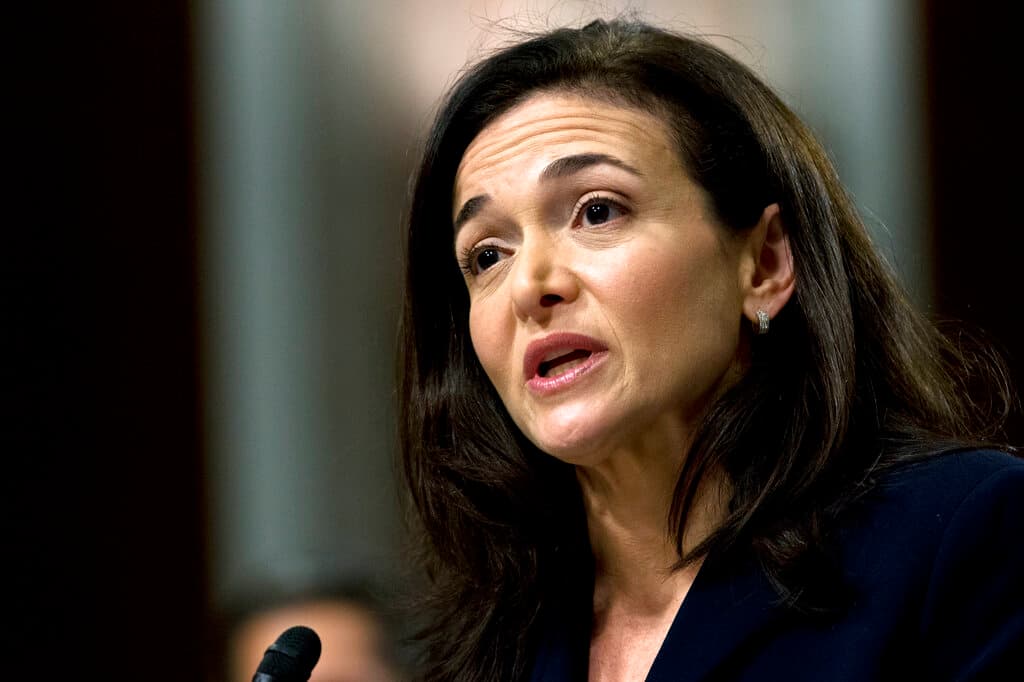Sheryl Sandberg’s ‘Screams Before Silence’ Testifies to the Sexual Atrocities Committed Against Women on October 7
In the face of silence, dismissiveness, or denialism, Sandberg’s new documentary bears witness to the horrors perpetrated by Hamas.

In “Screams Before Silence,” a 60-minute, presenter-led documentary film, Sheryl Sandberg spends four days in Israel interviewing victims of sexual abuse. In the film, Ms. Sandberg speaks to eye-witnesses who were also survivors of the massacre, released hostages, and first-responders. What I thought I knew, or had seen already, did not prepare me for what she caused me to watch.
The documentary opens with the sound of birds chirping, and the view of a picturesque residential home, encased in lush greenery. The camera then pulls back to disclose a view of this house through the bombed out, burnt shell of the neighboring house, the apocalyptic contrast to the bucolic paradise.
An ominous soundtrack accompanies us through the wreckage, paced with the tolling of the bell, a literal wakeup call, and a phonetic symbol of time running out for the remaining hostages, who, as the film asserts, are likely being sexually abused by their captors to this day, if they are still alive.
As the voices of the survivors and first-responders layer in bits and pieces of their story, the horror is brought back to life. Without even showing the worst of the footage — out of respect to the victims’ families, as a title card at the end of the film explains — “Silence Before Screams” depicts the most heinous crimes against humanity.
It tells stories of gruesome sexual violence, gang rapes, dismemberment, and genital mutilation — of severed breasts, and vaginas full of nails, wooden sticks, and other metal and plastic objects; of the sounds of women screaming in pain and terror; of dead women, shot in the face, continuing to be raped; of things this reporter never could have imagined having to write.
Since October 7, the trauma of the massacre has been layered on further by the trauma of so many women’s organizations and activists, having screamed for years, “Believe her,” falling silent when the sexual assault, rape, and sexual sadism was directed toward Israeli women.
Then there were the minimizers, who have downplayed or even denied the atrocities as exaggerations or lacking evidence. This was exemplified by the reaction to a New York Times investigative article on the subject.
The film, which is produced by Katsina Communications, the group behind the first season of “Fauda” and the creator of the documentary about the Nova Music Festival, “#Nova,” needed a powerful public figure to get the world’s attention on the matter.
Katsina’s CEO, Meny Aviram, managed to reach Ms. Sandberg through the film’s executive producers, Joey and Carol Lowe. Within minutes of speaking, she had joined up. At the New York premiere of the film this week, Ms. Sandberg introduced the film to the packed audience as “the most important work of my life.”
It is possible, Ms. Sandberg said, that everything she has ever done has led her to this. Everyone involved in the film echoed the feeling that despite the burden of taking on such painful subject matter, there was no hesitation.
The heroes of the film, though, are its subjects. One moment that illuminates this is when Ms. Sandberg interviews a former hostage named Amit Soussana. She had initially been reluctant to come forward with her story due to the discomfort she felt that this happened to her. Ms. Soussana bravely decided to talk, describing the constant state while in captivity of fear of molestation, because she too realized it was her calling to do so.
Ms. Sandberg also interviewed at the Nova site a volunteer first-responder, Rami Davidian, who when describing what he encountered — the bodies of women, with legs splayed open, tied to trees, bloodied, and tortured — breaks down in tears as he describes how he had to close their legs and cover them, so that no one should have to see the types of things he saw.
Many other first-responders and survivors spoke, each accounting similar things differently, the true horror of the extent of the atrocity unfolding in the collective re-telling — each one a distinct snapshot of the depravity of Hamas.
Ayelet Levy Shachar, whose 19-year-old daughter, Naama Levy, is still being held hostage by Hamas, recounts the now-famous video of her daughter from October 7:
“The first thing you see is the terrorists dragging Naama out. Her face looks terrified. She’s barefoot in her pajamas. And they’re bloodstained. They’re grabbing her by the hair and she’s all messed up. And I’m thinking of her hair and in my mind I’m stroking her hair like I’m always doing. …”
Ms. Sandberg closes the Q&A at the screening by recounting this story, and relating to her own three daughters. “She can’t do that now. Her daughter is still being held hostage by Hamas.” She continues, “These are the stories of people who are not here to tell their stories.”
If we don’t scream out for them, who will? “Screams Before Silence” is available on YouTube.

